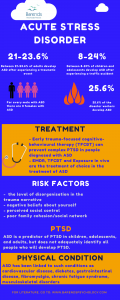Online acute stress disorder test.
This acute stress disorder test can be used to see if you meet the official DSM-5 criteria for acute stress disorder (ASD). However, this ASD test can not be used as a diagnostic tool and does not provide conclusive advice regarding your mental state. Fortunately, the results of the acute stresss disorder test offer a recommendation for potential further steps.
Acute stress disorder, also known as shock, is a mental disorder that may develop right after experiencing a traumatic event. Often, but not always, the diagnosis of ASD precedes the diagnosis of posttraumatic stress disorder (PTSD) [4]. In the majority of the cases, the ASD symptoms disappear within a month after the traumatic event, which can be checked with this acute stress disorder test.
Both PTSD and ASD negatively affect functioning on different aspects in life, such as social life and occupation. People diagnosed with ASD more often than people without ASD experience flashbacks, sleeping problems and concentration problems. Fortunately, ASD treatment reduces the ASD symptoms significantly [1],[2] and improves the quality of life [3].
Scroll down to take the acute stress disorder test immediately.
Go to:
- What is ASD?
- What causes ASD?
- ASD diagnosis.
- ASD treatment.
- How to cope with ASD.
- Helping your partner with ASD.
- ASD facts.
- Online counseling for ASD.
- Take me to the homepage.
At Barends Psychology Practice, acute stress disorder treatment is offered. Go to contact us to schedule a first, free of charge, session. (Depending on your health insurance, treatment may be reimbursed).
(Advertisement. For the acute stress disorder test, please scroll down.)
Literature used for acute stress disorder test page:
- [1] Ponniah, K., & Hollon, S. D. (2009). Empirically supported psychological treatments for adult acute stress disorder and posttraumatic stress disorder: a review. Depression and anxiety, 26, 1086-1109.
- [2] Kornør, H., Winje, D., Ekeberg, Ø., Weisæth, L., Kirkehei, I., Johansen, K., & Steiro, A. (2008). Early trauma-focused cognitive-behavioural therapy to prevent chronic post-traumatic stress disorder and related symptoms: a systematic review and meta-analysis. BMC psychiatry, 8, 81.
- [3] Holbrook, T. L., Hoyt, D. B., Coimbra, R., Potenza, B., Sise, M., & Anderson, J. P. (2005). High rates of acute stress disorder impact quality-of-life outcomes in injured adolescents: mechanism and gender predict acute stress disorder risk. Journal of Trauma and Acute Care Surgery, 59, 1126-1130.
- [4] Bryant, R. A., & Harvey, A. G. (2003). Gender differences in the relationship between acute stress disorder and posttraumatic stress disorder following motor vehicle accidents. Australian & New Zealand Journal of Psychiatry, 37, 226-229.


